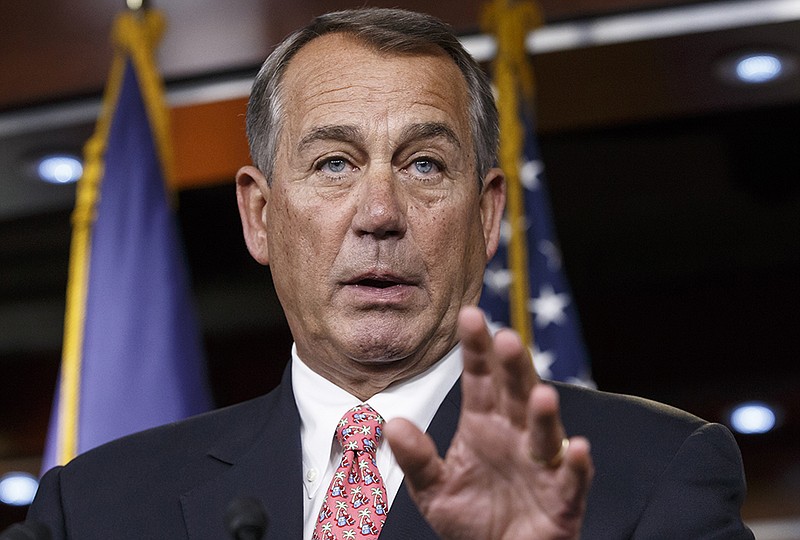WASHINGTON - House Speaker John Boehner's prospects for a new term appeared secure Monday despite grumblings from tea party-aligned dissidents on the eve of a Republican takeover of Congress, while GOP leaders in both houses pointed toward a swift veto showdown with President Barack Obama over the long-stalled Keystone XL pipeline.
Senate Republicans, winners of a majority in last fall's elections, began laying down markers for legislative battles ahead. "Tax reform should not be used as an excuse to raise taxes on the American people," wrote Sen. Orrin Hatch of Utah, who will become chairman of the tax-writing Senate Finance Committee. "Any such effort is a needless distraction," he added, pointedly rejecting a long-held view of the White House and many Democrats.
Tax reform was a distant target as congressional veterans and newcomers alike looked ahead to a day of pomp and ceremony beneath the Capitol Dome.
Kentucky Sen. Mitch McConnell's ascension Tuesday to the post of Senate majority leader was automatic following his approval by rank-and-file Republicans late last year.
That wasn't the case in the House, where the election of a speaker is the main event on any opening day's agenda. Reps. Louie Gohmert of Texas and Ted Yoho of Florida put themselves forward as challengers, and the Tea Party Patriots tweeted out a request for rank and file Republicans to support one or the other.
Roughly a dozen Republicans have announced they will oppose Boehner's election, but that was far short of the number needed to place his election in jeopardy. One lawmaker, Rep. Lou Barletta of Pennsylvania, said Boehner "deserves a chance" to try and pass a conservative agenda in cooperation with the Senate under Republican control.
The speaker's spokesman, Michael Steel, said Boehner "was selected as the House Republican Conference's choice for speaker in November, and he expects to be elected by the whole House this week."
Nor did any of the rebels predict they would succeed in toppling the 65-year-old Ohioan. Instead, they said the current high command wasn't conservative enough.
Virginia Rep. Dave Brat, who defeated former Majority Leader Eric Cantor in a primary last summer, said the Republican leadership has "strayed from its own principles of free market, limited government, constitutional conservatism. We are at a crucial turning point in our country's history."
Two years ago, Boehner was faced with similar criticism, and sweated out his election to a second term.
His hand is considerably stronger this year as a result of the sweep of the Republican electoral triumph. The party will hold 246 House seats in the new Congress, to 188 for the Democrats, the biggest GOP majority in nearly 70 years.
It would have been bigger still, but New York Rep. Michael Grimm's resignation took effect one day before the new Congress convened. He pleaded guilty last month to federal tax evasion.
The intra-party leadership struggle underscored the political peril facing Republicans as they looked ahead to two-house control of Congress. Yet the evident ability to pass Keystone pipeline legislation showed their potential to advance an agenda.
The legislation passed the House but died in a Democratic-led filibuster in the Senate late last year. Now, Republican leaders intend to push the bill through the House late this week, and appear to have more than enough votes to clear it through the Senate as well, given the Republican pickup of nine seats in the elections.
While Obama has not said if he will reject the measure, White House spokesman Josh Earnest outlined a series of concerns with the measure before adding, "I'm not prepared at this point to issue a veto threat related to that specific piece of legislation."
But Republicans stand ready to cast the measure as a bipartisan jobs bill of the type that should be signed into law.
"There's a lot we can get done together if the president puts his famous pen to use signing bills rather than vetoing legislation his liberal allies don't like," McConnell said late last year.
Earnest was less ambiguous about another issue.
Referring to an assertion by a Louisiana reporter, he said Rep. Steve Scalise of Louisiana, the third-ranking House GOP leader, had once described himself as "David Duke without the baggage." Earnest also said Scalise's presence in the leadership of House Republicans "says a lot about who they are."
Scalise spoke more than a dozen years ago to a white supremacist organization founded by Duke. The lawmaker said recently the appearance was a mistake, and said he condemns the group's views.
